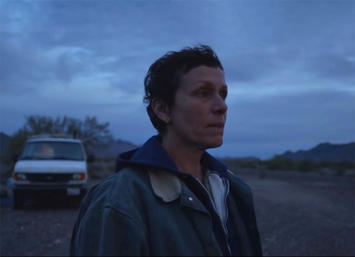
This past year of the pandemic has, for many, been one of struggle and isolation. So films about single older working-class women dealing with economic and personal challenges might not seem inspiring at the moment. But the insights they provide into how belonging helps people navigate hardship make them worth a look.
Chloe Zhao’s Golden Globe-winning film Nomadland, follows Fern, a 60-something working-class woman who, as she says, likes to work and needs the money. Zhao created Fern as a composite of two of the real older women Jessica Bruder features in the non-fiction book on which the film is based. Like the real Swankie and May, Fern travels the western US, from short-term job to short-term job, living in the van she has retrofitted with a mattress, a propane stove, a bucket toilet, and enough storage space for a few dishes, tools, and clothes. She also fits in a notebook of old slides and a box of old photos.
Like many other nomads, Fern lives in the van because she has lost her house, and she takes on a series of working-class jobs – in an Amazon warehouse, at a campground, on a beet farm – to earn enough to get by. As reviewers have noted, Bruder’s book offers a more political take on the economic changes that have displaced many working- and middle-class older Americans. “In mindset and appearance,” Bruder writes, the nomads “are largely middle-class.” But the work they’re doing now is clearly working-class, and, as A.O. Scott put it in his New York Times review, they “are footloose but also desperate, squeezed by rising inequality and a frayed safety net.”
Zhao may have softened the book’s political edge, but the film emphasizes the idea of community. Most of her characters travel alone, but they survive largely through mutual aid. On the road, Fern finds a mobile, serendipitous working-class community, led by nomad guru Bob Wells, who appears as himself in the film. As he tells Fern, Bob organizes gatherings and helps people learn how to survive on the road as a way of honoring his son, who died of suicide. Instead of letting himself be engulfed by grief, he devotes his life to helping others, creating a sense of belonging for people who have no permanent homes other than the vehicles in which they live. He explains that never says goodbye to anyone. Instead, he says “see you down the road” – and, he insists, he often does. This is true for Fern, as well. As she travels, she keeps reuniting with people she has met earlier, on the job, at nomad gatherings, on the side of a road. Many teach her practical lessons about how to survive, but they also provide support and companionship in a nomadic life.
As Fern, Frances McDormand creates a powerful sense of the character’s grief over the loss of her husband and the life they had together. Fern feels a strong connection to the company town where her husband worked in a gypsum mine, and she values the bonds she forms with other nomads. Twice in the film, she rejects offers of comfortable, safe, warm homes, first by her sister and later by a man with whom she might well have created a sustaining partnership. She chooses the solitude and movement of nomad life.
Fern’s story might seem like a working-class tragedy. If belonging is central to working-class culture, as some scholars argue, then ending up alone, far from one’s home place, would be the worst possible outcome of a working-class life. And if stability is a desirable quality of working-class jobs and lives, then living on the road, working temporary low-wage jobs, not earning enough to cover the cost of repairs when your van breaks down would seem like a nightmare. But Fern’s story is not a nightmare. It is an alternative vision of working-class belonging, one that relies on good will and persistence in day-to-day survival but also friendship and mutual aid.
Read the rest of this piece at Working-Class Perspectives.
Sherry Linkon is an affiliate of the Kalmonovitz Initiative for Labor and the Working Poor at Georgetown University. She co-authored Steeltown U.S.A.: Work Memory in Youngstown.
Photo: screenshot from official trailer for Nomadland.













Fraternal lodges
and other such working-class social-support groups were mainstays of an earlier time in America. Though they don't meet today's tests for inclusiveness, their absence has frayed the civil fabric.